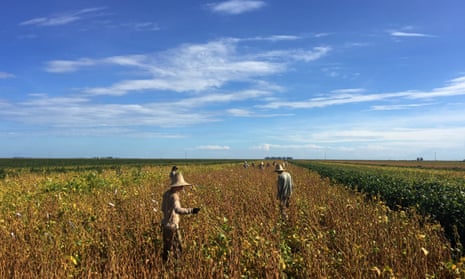A Brazilian Congress commission has approved a controversial bill to lift restrictions on pesticides despite fierce opposition from environmentalists, prosecutors, health and environment ministry bodies, and even United Nations special rapporteurs.
Driven by a powerful agribusiness lobby, the bill now needs to be voted on in both houses of Congress and sanctioned by President Michel Temer before becoming law.
Its proponents say it will free up bureaucracy and modernise dated legislation. But the bill has generated fierce opposition in Brazil, one of the world’s biggest food producers and biggest consumers of pesticides, even those banned in other countries.
Opponents dubbed it the “poison package” and said it would lead to the indiscriminate use of dangerous pesticides, while 250,000 signed an online petition against it.
“The law will make us more permissive than we already are,” said Larissa Bombardi, a professor of geography and pesticides specialist at the University of São Paulo. “The economic interest will prevail over human and environmental health.”
Of 121 pesticides permitted in Brazil for coffee production, 30 are already banned in the European Union, including the toxic herbicide paraquat, Bombardi reported in an extensive 2017 study.
The bill overhauls existing legislation, allowing for pesticides to be given temporary register if the approval process has taken over two years and three countries in the OECD (Organisation for Economic Cooperation and Development) have already approved it.
It puts the Ministry of Agriculture in charge of approving new products, removing the Health and Environment Ministries from decision-making and making their roles advisory and it stops towns and states from introducing their own restrictions on pesticides.
“It is clear there is opposition, there is passion. There are people who think you do agriculture organically. People use pesticides like medicine,” said the Congress committee president Tereza Cristina Dias, a lawmaker who also presides over the parliamentary farming front.
Dias said the controversial ‘temporary register’ of products was only in the case of a new threat to crops from pests and that product approval would become more organised. “The Ministry of Agriculture will do the coordinating, the governance and the transparency,” she said.
A long list of organisations and specialist bodies disagreed. The project will bring “serious losses to the protection of human health,” wrote Ronald dos Santos, president of the National Health Council, part of the Ministry of Health. Federal Prosecutors said much of it was unconstitutional and popular TV chef Bela Gil turned up to a commission session to protest, waving a “poison package” placard.
In a letter to Brazil’s Foreign Minister Aloysio Nunes, United Nations Special Rapporteurs John H. Knox, Hilal Elver, Baskut Tuncak, Dainius Puras and Léo Heller described Brazil as “reportedly the largest consumer and importer of pesticides in the world”. The country already lets foreign companies exploit its lower standards of protection, they said, “exporting hazardous pesticides prohibited from use in their domestic markets to be used in Brazil.”
Under Brazil’s current legislation, pesticides with elements considered teratogenic, carcinogenic, mutagenic, endocrine disruptive, or posing risks to the reproductive system can’t be registered, they said. But under the bill, hazardous pesticides will only be prohibited when there is a “scientifically established unacceptable risk” – a definition too vague to be effective.
Greenpeace attacked lawmakers for approving the bill in the face of such wide opposition.
“They want a toxic product to look less threatening,” said Marcio Astrini, Greenpeace Brazil’s public policy coordinator. “The toxic garbage being banned in the rest of the planet will be sold here.”
